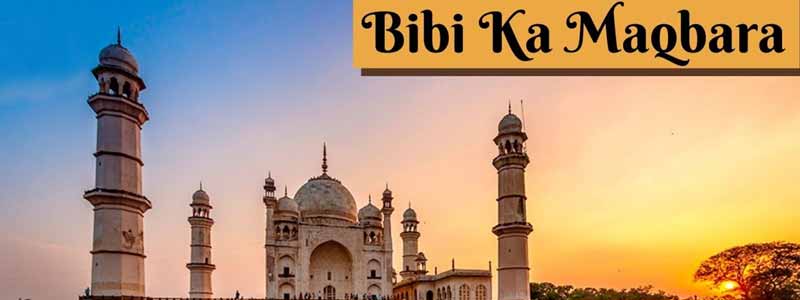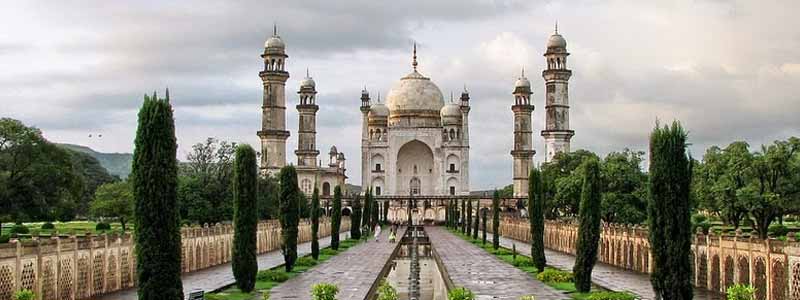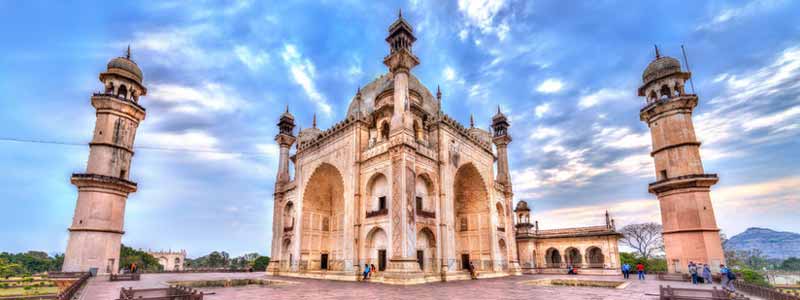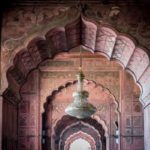Bibi Ka Maqbara, or Tomb of the Lady, stands gracefully and can be viewed from a distance on the road between Daulatabad and Aurangabad. A symbol of remembrance and memento of love, this monument has been denied the attention it deserves and has become a part of the hidden gem of heritage architecture. Bibi-Ka-Maqbara is located in the historical city of Aurangabad in Maharashtra and is built in the memory of the wife of Emperor Aurangzeb.
Who shrunk the Taj Mahal? That’s the first thought that comes to mind on viewing the Bibi Ka Maqbara, which is also referred to as the “Taj of the Deccan”. It has a striking resemblance to one of the world’s most renowned monuments and the UNESCO world heritage site. Though the comparison between the Taj Mahal and Bibi Ka Maqbara seems uncanny when factors such as political position and the financial prowess of the Emperor Shah Jahan are taken into account as compared to the Aurangzeb’s rule. Read on to find out the following details of this glorious monument.

Interesting Facts about Bibi ka Maqbara
- Though Bibi Ka Maqbara looks strikingly like the Taj Mahal, it has its own beauty and charm. And what adds to its glory is that it is the only monument erected by the Mughals in the Deccan and, hence, known as the ‘Taj of the Deccan’.
- The Taj of Agra is constructed completely in marble, whereas the Bibi-Ka-Maqbara, except for the small central portion of the main mausoleum, the rest of the building is constructed in red stone, lime and stucco plaster.
- The mortal remains of the queen Rabia Daurani are kept below the ground level adorned with an octagonal jali marble screen around the tomb.
- The Maqbara is 30 per cent smaller in size than the Taj Mahal and was completed in 7 years.
- A small archaeological museum is located behind the monument honouring its history and architecture.

History of Bibi ka Maqbara
Dilras Banu Begum was a princess belonging to the Persian Safavid Dynasty and was married to Mughal emperor Aurangzeb on 8 May 1637. She went on to become Aurangzeb’s chief consort and most beloved wife as well. She and Aurangzeb had five children – Zeb-un-Nissa, Zinat-un-Nissa, Zubdat-un-Nissa, Muhammad Azam Shah and Sultan Muhammad Akbar. After the birth of their fifth child, Dilras Banu Begum contracted a fever which proved to be fatal and she died on 8 October 1657, Agra Tour Packages.
Aurangzeb was deeply afflicted due to his beloved wife’s death and their eldest son Azam Shah suffered greatly as well, so much so that he had a nervous breakdown. In 1660, three years after the death of Dilras Banu Begum, Aurangzeb commissioned the construction of her final resting place. Bibi ka Maqbara is said to be built in between 1651 and 1661. According to the records, the cost of construction of the mausoleum was about seven lakh rupees. The monument was designed and erected by Ata-Ullah, the architect and Hanspat Rai as the engineer. The marbles used in the construction were brought from the mines in Jaipur. Here, Dilras was buried under the posthumous title of ‘Rabia-ud-Daurani’.

How to Reach?
Bibi ka Maqbara is situated around 5 km from the heart of Aurangabad city. You can opt for a public transport like an autorickshaw or bus or hire a taxi to reach the Maqbara. It is advisable to fix the tariff priorly in case you are travelling by autorickshaw.
By Train: Aurangabad is the nearest railway station, which is approximately 12 kms from Bibi-ka-Maqbara.
By Road: If you are in Aurangabad, the best option is take an auto rickshaw to visit Bibi-ka-Maqbara. You can also avail the city buses or hire a private car.
By Flight: The airport at Aurangabad is well connected with all the major cities of India. It is 11 kms away from Bibi-ka-Maqbara.








